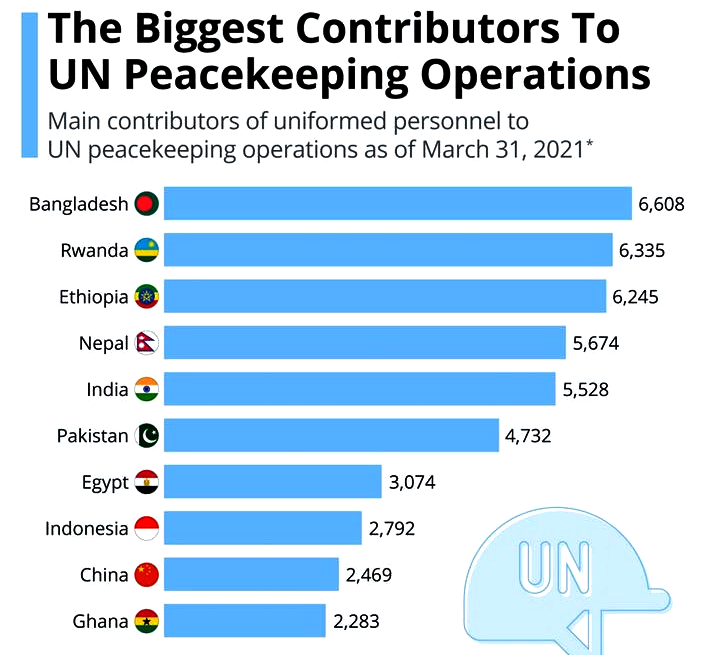International Relations
Women In Peacekeeping
- 10 Mar 2022
- 6 min read
For Prelims: United Nations Peacekeeping mission, United Nations Security Council (UNSC), Global Effort Initiative, UN Action for Peacekeeping (A4P)
For Mains: Important International Institutions, Women In Peacekeeping
Why in News?
Recently, many women soldiers were training to be a part of a United Nations Peacekeeping mission.
- For more than a decade, the United Nations (UN) has called for more participation from women in conflict prevention, post-conflict peacebuilding and peacekeeping.
What is UN Peacekeeping?
- UN Peacekeeping began in 1948 when the UN Security Council authorised the deployment of UN military observers to the Middle East.
- UN Peacekeeping helps countries navigate the difficult path from conflict to peace.
- It deploys troops and police from around the world, integrating them with civilian peacekeepers to address a range of mandates set by the UN Security Council (UNSC) and the General Assembly.
What is Background of Indian Women in Peacekeeping Forces?
- Background: For the first time in the history of UN peacekeeping, India sent an all-female Formed Police Unit (FPU) to be deployed in Liberia in 2007 after a civil war ravaged the African nation.
- Intent: Recently, at the UN Security Council (UNSC), Indian officials called for more female participation in public life and the elimination of violence against them as a prerequisite for promoting lasting peace around the world.
- Significance: In a profession that continues to be heavily dominated by men, and in a nation that is riddled with gender violence, these female police officers from India are breaking stereotypes to represent their country on the world stage.
What is the current status of Women in UN Peacekeeping forces?
- Multi-Role: Women are deployed in all areas – police, military and civilian – and have made a positive impact on peacekeeping environments, including in supporting the role of women in building peace and protecting women's rights.
- Current Numbers: According to the UN, in 2020, out of approximately 95,000 peacekeepers, women constitute 4.8% of military contingents and 10.9% of formed police units and 34% of justice and corrections government-provided personnel in UN Peacekeeping missions.
- Global Effort Initaitive: UN Police Division launched 'the Global Effort' to recruit more female police officers into national police services and into UN police operations around the world.
- The 2028 target for women serving in military contingents is 15%, and 25% for military observers and staff officers.
- UNSC Resolution: UN Security Council resolution 1325 (UNSCR1325) has called for an expansion of the role and contribution of women in its operations, including uniformed women peacekeepers.
- Action for Peacekeeping (A4P) initiative: The UN Action for Peacekeeping (A4P) initiative views the Women, Peace and Security agenda as critical to enhancing peacekeeping operations’ performance.
- This can be achieved through supporting women’s full participation in peace processes and making peacekeeping more gender-responsive, including through increasing the number of civilian and uniformed women in peacekeeping at all levels and in key positions.
Why is it important to have women peacekeepers?
- Improved Operations And Performance: Greater diversity and a broadened skillset means improved decision‐making, planning and results, leading to greater operational effectiveness and performance.
- Better Access: Women peacekeepers can better access the population, including women and children - for example, by interviewing and supporting survivors of gender-based violence and violence against children - thereby generating critical information that would otherwise be difficult to reach.
- Building Trust and Confidence: Women peacekeepers are essential enablers to build trust and confidence with local communities and help improve access and support for local women.
- For example, by interacting with women in societies where women are prohibited from speaking to men.
- Inspiring and Creating Role Models: Women peacekeepers serve as powerful mentors and role models for women and girls in post-conflict settings in the host community, setting examples for them to advocate for their own rights and pursue non‐traditional careers.
PYQ
Q. Which one of the following is not related to United Nations? (2010)
(a) Multilateral Investment Guarantee Agency
(b) International Finance Corporation
(c) International Centre for Settlement of Investment Disputes
(d) Bank for International Settlements
Ans: (d)







